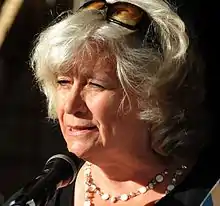Margareta Winberg
Gun Margareta Winberg (born Gustafsson 13 August 1947) is a Swedish Social Democratic politician. Winberg held various ministerial posts in the Third cabinet of Ingvar Carlsson and Cabinet of Göran Persson from 1994 to 2003, and was Deputy Prime Minister of Sweden from 2002 to 2003.[1] She was Minister for Agriculture from 1994 to 1996 and again from 1998 to 2002, Minister for Labour from 1996 to 1998, and in addition held the position of Minister for Gender Equality from 1998 to 2003.
Margareta Winberg | |
|---|---|
 | |
| Deputy Prime Minister of Sweden | |
| In office 21 October 2002 – 31 October 2003 | |
| Prime Minister | Göran Persson |
| Preceded by | Lena Hjelm-Wallén |
| Succeeded by | Marita Ulvskog (Acting) |
| Minister of Gender Equality | |
| In office 7 October 1998 – 21 October 2002 | |
| Prime Minister | Göran Persson |
| Preceded by | Ulrica Messing |
| Succeeded by | Mona Sahlin |
| Minister of Agriculture | |
| In office 7 October 1998 – 21 October 2002 | |
| Prime Minister | Göran Persson |
| Preceded by | Annika Åhnberg |
| Succeeded by | Ann-Christin Nykvist |
| In office 7 October 1994 – 22 March 1996 | |
| Prime Minister | Ingvar Carlsson |
| Preceded by | Karl Erik Olsson |
| Succeeded by | Annika Åhnberg |
| Minister of Employment | |
| In office 22 March 1996 – 7 October 1998 | |
| Prime Minister | Göran Persson |
| Preceded by | Anders Sundström |
| Succeeded by | Björn Rosengren |
| Personal details | |
| Born | Gun Margareta Gustafsson 13 August 1947 Sjuntorp, Sweden |
| Political party | Social Democratic Party |
| Spouse(s) | Jörn Svensson |
| Children | 3 |
She became a very controversial figure in the public debate, after an interview she gave to the Swedish documentary The Gender War in 2005. In the second part of the two-part documentary, Winberg expressed strong support for radical feminism, for the ideologist Eva Lundgren and for forcing institutes of higher education to teach feminist theory as fact, in order to change society.[2]
Within the Social Democrats, she had a eurosceptic profile, and was one of two ministers campaigning for the "no" side in the 1994 referendum on Sweden's membership in the European Union. She similarly was against adopting the euro, but as deputy prime minister, she held a low profile in the 2003 referendum on the issue.
From 2003 to 2007, she served as Sweden's ambassador to Brazil.
References
- Members of the Swedish Government 1946- Archived 2005-09-12 at the Wayback Machine, Government of Sweden, accessed 2010-07-09
- The Gender War (full documentary) Youtube link - english subtitles
External links
- Margareta Winberg at the Riksdag website
| Political offices | ||
|---|---|---|
| Preceded by Karl Erik Olsson |
Minister for Agriculture 1994–1996 |
Succeeded by Annika Åhnberg |
| Preceded by Anders Sundström |
Minister for Labour 1996–1998 |
Succeeded by Björn Rosengren |
| Preceded by Annika Åhnberg |
Minister for Agriculture 1998–2002 |
Succeeded by Ann-Christin Nykvist |
| Preceded by Ulrica Messing |
Minister for Gender Equality 1998–2003 |
Succeeded by Mona Sahlin |
| Preceded by Lena Hjelm-Wallén |
Deputy Prime Minister of Sweden 2002–2003 |
Succeeded by Marita Ulvskog |
| Diplomatic posts | ||
| Preceded by Staffan Åberg |
Swedish Ambassador to Brazil 2004–2007 |
Succeeded by Annika Markovic |